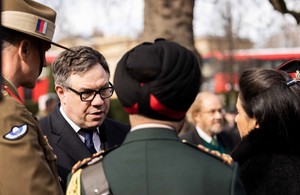Legal aid sector put on sustainable footing for years to come
- Wide-ranging reforms will make the legal aid system fit for 21st century
- Up to an extra £135 million spent on legal aid every year, following independent review of fees
- Millions more will have access to legal aid as part of proposed reforms to the means test
Up to an extra £135 million will be spent on the sector every year to match the recommendation made by an independent review of the system, overseen by Sir Christopher Bellamy QC. When added to the extra £200 million each year to speed up the courts system, it will bring total taxpayer funding for criminal defence to £1.2 billion a year.
The funding boost sits alongside the most ambitious reform of criminal legal aid in decades that would ensure professionals are better paid for the work they actually carry out and help free up capacity in courts.
For example, one change would boost pay for lawyers representing suspects in police stations by 15% to tackle the perverse incentive that currently encourages lawyers to wait and represent defendants in Crown Courts because it pays better. The proposals will improve the advice available in police stations and stop cases going to court unnecessarily, delivering speedier justice to victims.
The proposals will also give more people the opportunity to forge a career in criminal law, whatever their background, by funding the training and accreditation of solicitors and solicitor advocates and removing barriers for members of the Chartered Institute of Legal Executives (CILEX).
The government plans also make the legal aid system fairer by making sure it gets to those who need it most. Proposed changes will open up access to civil legal aid for around two million more people, and will remove the means test altogether for some applicants. Domestic abuse victims who are disputing house ownership will particularly benefit from our proposal that disputed assets will not count towards their wealth.
The financial cap on eligibility for Crown Court defendants will also be removed, ending the so-called ‘Innocence Tax’ which has forced some innocent people to pay their own legal costs despite being acquitted.
Deputy Prime Minister, Lord Chancellor and Justice Secretary Dominic Raab said:
We owe our whole legal profession – solicitors, barristers, court staff and judiciary – a debt of gratitude for keeping the wheels of justice turning over the last two years.
That’s why we are accepting Sir Christopher Bellamy’s recommendation for an uplift in fees and a total of £135 million extra investment to ensure legal representation is there for those who most need it as we build back a stronger and fairer society after the pandemic.
The proposed changes to criminal legal aid are in step with the recommendations made by the independent review and are designed to make the legal aid system sustainable for the future. Other changes to modernise the legal aid system include:
- A restructuring of the fee schemes so they properly reflect the work that legal professionals do today
- Creating an Advisory Board, which will represent all parts of the profession, helping shape criminal legal aid policy moving forward.
The changes to the legal aid means test will be achieved by raising the income and capital thresholds for legal aid. This means that over 2 million more people in England and Wales will have access to civil legal aid and 3.5 million more will have access to criminal legal aid at the magistrates’ court.
For the first time ever, legal representation will be made free for all under-18s and parents challenging doctors over withdrawal of their child’s life support, as will legal help for families at inquests where there has been a potential breach of human rights.

